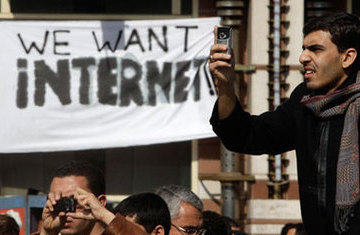
Above: Using word of mouth coupled with old technology like
dial-up, Egyptians are circumventing Internet shut down. (AP)
Tadias Magazine
By Tadias Staff
Published: Wednesday, February 2, 2011
New York (Tadias) – News agencies worldwide were quick to dub the recent protests in North African and Middle Eastern nations as the “The Facebook Revolution.” Fearing the resourcefulness of young people using social media tools such as Twitter and Facebook to organize the toppling of regimes, government authorities decided to turn off mobile and internet connections.
In the case of Egypt, a nation that is home to Africa’s largest blogging community and where a quarter of its 80 million people enjoy online access, the impact of the lock-down was immediate. “We’re seeing a uniquely draconian measure by the Egyptian authorities to completely cut off an entire country which was previously integrated into the Internet,” says Neil Hicks, policy advisor of the non-profit advocacy group Human Rights First. “It shows the level of desperation the government currently has in face of the protests.” As a result, leaders have turned to traditional methods of organizing says Hicks: “They’re using old-fashioned word of mouth…They’re aware of the possibilities of surveillance if they use these technologies. So they get on a motorbike or car, and go to the next neighborhood and arrange things.”
Companies such as Google and an international group of savvy techies are also working hard to put more tools at the hands of those being silenced. On Monday, Google announced that it had launched “Speak to Tweet“, a collaborative effort by three companies – including Twitter and SayNow, which is designed to bypass the internet censorship.
“Like many people we’ve been glued to the news unfolding in Egypt and thinking of what we could do to help people on the ground,” said Ujwal Singh, co-founder of SayNow and Abdel Karim Mardini, Google’s product manager for the Middle East and North Africa. “Over the weekend we came up with the idea of a speak-to-tweet service—the ability for anyone to tweet using just a voice connection.”
According to the group’s blog post: “anyone can tweet by simply leaving a voicemail on one of these international phone numbers (+16504194196 or +390662207294 or +97316199855) and the service will instantly tweet the message using the hashtag #egypt. No Internet connection is required. People can listen to the messages by dialing the same phone numbers or going to twitter.com/speak2tweet.”
In his article entitled “5 Ways the Protesters Are Beating the Blackout” Steven Hoffer of AOL News highlights landlines as another method that Egyptians have employed to bypass the net blockade: “That’s right, dial-up. International numbers to connect through this seemingly outdated method of accessing the Internet are circulating throughout Egypt,” writes Hoffer. “After a little static, pinging and waiting, the dial-up numbers are allowing some users to hop back on the Internet.” Among those providing such a service is the Paris-based French Data Network, which has extended dozens of lines to Egyptian users.
A global network of free speech activists on the Internet under the umbrella organization Telecomix are also utilizing new media tools to bypass the information blackout. Per The Huffington Post, the group is organized using chat rooms, wikis, and collaborative writing tools. This largely decentralized group of activists has worked “to inform Egyptians about their communications options while receiving incoming messages from them. Telecomix has previously worked on free speech efforts in Tunisia, Iran, China and other countries who have tried to censor or block parts of the Internet.”
The Canadian company HootSuite, which offers users a social media dashboard for posting to Twitter, Facebook and other social networks, is also helping Egyptians overcome Internet shutdown. The venture has reported a sevenfold increase in Egyptian subscriptions during January.
As Google noted: “We hope that this will go some way to helping people in Egypt stay connected at this very difficult time. Our thoughts are with everyone there.”
–
Video: In Egypt, new media is part of message
Visit msnbc.com for breaking news, world news, and news about the economy
Watch: Mubarak Resigns, Hands Power to Military (AP)
Watch scenes from Tahrir Square: The Revolution Victorious

























